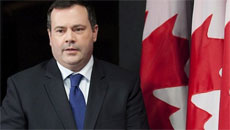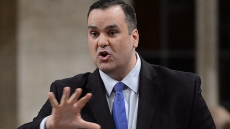TORONTO — Finance Minister Joe Oliver says the federal government has already considered the dramatic slide in oil prices in its fiscal forecasts.
"When we took into account the oil price decline which had already occurred, we made the assumption that the prices would stay at the low level for the entire period," Oliver told a media conference on Thursday.
Oliver said that's "a relatively conservative assumption and we'll continue to monitor the level of prices."
The finance minister's comments were delivered shortly before OPEC, the international group that coordinates industry policies for crude oil, announced it would maintain production at current levels, despite an increasing oversupply that has pulled down oil prices.
Oliver declined to discuss the direction of oil prices, but said that he believes "the major risks to Canada are external."
The finance minister spoke to the media Thursday ahead of his first pre-budget consultation roundtable in Toronto that included members of the Canadian banks, mining industry and other special interest groups, as well as representatives from technology companies like Facebook and Air BnB.
Over the next few weeks Oliver will visit seven other cities across the country — including St. John's, Quebec, Calgary and Vancouver — for further consultations.
Housing prices are one topic that will likely be discussed in the meetings, though Oliver has reiterated his stance that Ottawa won't be taking any action to protect the market.
"We certainly do not believe that the current situation merits any major moves," he said.
"The longer-term objective is to gradually reduce taxpayer exposure to the residential real estate market, but we have no specific plan."
Oliver says the government's long term aim is to gradually reduce taxpayer exposure to the residential real estate market. His predecessor, Jim Flaherty, moved four times to tighten mortgage lending rules in an effort to cool a hot real estate market.
The minister's comments follow an IMF warning on Wednesday that the housing market and household debt represent key risks to the Canadian economy.
An IMF official estimated Canada's housing market was over-evaluated by roughly 10 per cent on a national scale, although in some regions those estimates could reach as high as 20 per cent.
The IMF predicted a soft landing for the housing market, but warned Canada could be at risk of a sharp correction if interest rates rose too quickly and the job market suffered a downturn.





